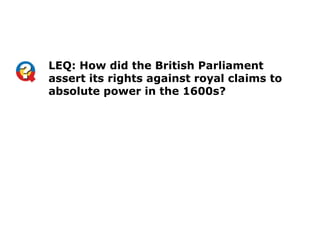
(16.3) absolutism parliament triumphs in england
- 1. LEQ: How did the British Parliament assert its rights against royal claims to absolute power in the 1600s?
- 2. Background: England took a different path than France did in the 1600s. Though English rulers attempted to increase their authority, Parliament expanded its own influence.
- 3. Tudor monarchs Henry VIII and Elizabeth I worked with Parliament to rule England. Both sought approval As a result, from Parliament, Parliament became even as they worked accustomed to being to control it. consulted. In fact, Elizabeth’s skill at handling Parliament helped make her a popular ruler, who came to be known as “Good Queen Bess.”
- 4. • James I – the first Stuart monarch, who repeatedly clashed with Parliament Harmony between the monarchy and Parliament came to an end with the Stuarts. Because Elizabeth died childless, her throne went to James Stuart, the king of Scotland. James I, as he came to be known, clashed with Parliament.
- 5. • dissenters – Protestants who differed with the Church of England • Puritans – a group of dissenters who sought to “purify” the church of Catholic practices • Charles I – a Stuart monarch who inherited the throne in 1625 and dissolved Parliament, then fought the English Civil War against it Both James I and Charles I dissolved Parliament, but faced other challenges to their authority. • James clashed with dissenters, especially Puritans, who wanted to “purify” the church. • He rejected their demands. Charles I Like his father, he behaved inherited the like an absolute monarch and throne in 1625. dissolved Parliament in 1629.
- 6. When it met, it However, Charles launched its own summoned revolt against the Parliament in 1640 king. because he needed funds to suppress a Parliament’s Scottish rebellion. actions led to the English Civil War. When Charles tried to arrest the radical members of Parliament they escaped and raised an army.
- 7. Oliver Cromwell – leader of the supporters of Parliament during the English Civil War, who went on to lead the short-lived Commonwealth between 1649 and 1658 The English Civil War lasted from 1642 until 1651. On one side were On the other were supporters of supporters of Parliament, Charles I, called called Roundheads. They Cavaliers. They were country gentry, were wealthy town-dwellers, and nobles. Puritan clergy. The Roundheads were led by a skilled general, Oliver Cromwell, and defeated the Cavaliers. The king was tried and executed.
- 8. Parliament declared England a republic, known as the Commonwealth, under Oliver Cromwell’s leadership. Charles II, the Cromwell uncrowned heir, crushed the attacked from Ireland uprising. and Scotland. A group called the Levellers challenged the Common-wealth from within. They wanted the poor to have a say. Cromwell suppressed them and began to rule as a dictator.
- 9. Puritans gained a voice in the society of the Commonwealth. Their goal was to root out godlessness. Sunday was set aside for religious observance, and anyone caught at other tasks could be fined. All theaters and many taverns were closed. Education for all people was encouraged. Marriage based on love and fidelity was also encouraged.
- 10. When Cromwell died in 1658, the Puritans lost control and the Commonwealth came to an end. • Parliament invited Charles II back from exile in 1660. • Charles II was popular because he reopened theaters and taverns and had a lively court. He also avoided clashing with Parliament.
- 11. James II, Charles’s brother, inherited the throne in 1685 but wasn’t there long. • He openly practiced his Catholic faith. • Alarmed, Parliament invited James’s Protestant daughter Mary and her husband William to become rulers in 1688. They accepted, and James II fled to France. This bloodless transfer of power was called the Glorious Revolution.
- 12. English Bill of Rights – several acts of Parliament that limited the power of the monarchy and restated the rights of English citizens William and Mary had to accept several acts of Parliament known as the English Bill of Rights. It required the monarch to summon Parliament regularly. It gave the House of Commons the “power of the purse.” It barred any Roman Catholic from the throne. It restated the right of trial by jury and affirmed the principle of habeas corpus.
- 13. limited monarchy – a monarchy that rules in partnership with Parliament or another governing body constitutional government – a government whose power is defined and limited by law Thus, the Glorious Revolution created a limited monarchy. English rulers had to govern in partnership with Parliament, which was quite radical at the time. During the next century, Britain evolved a constitutional government in which the government’s power is limited by law.
- 14. • cabinet – parliamentary advisors to the king who in time gained official status Political parties The cabinet The head emerged in the evolved in the of the late 1600s. 1700s to help cabinet and advise came to be The two main the king, and known as parties were in time gained the prime the Tories and official status. minister. the Whigs.
- 15. • oligarchy – a government in which the ruling power belongs to a few people British government was an oligarchy in the 1700s, with the right to vote limited to a few male property owners. The upper class However, the middle squeezed the poor by class was growing, buying up their land and it produced and evicting tenant talented entrepreneurs farmers, which they who would help bring legalized through their about the Industrial control of Parliament. Revolution.
- 16. LEQ: How did the British Parliament assert its rights against royal claims to absolute power in the 1600s? By attempting to share power with monarchs, by waging civil war and creating the Commonwealth, and by establishing a Bill of Rights
